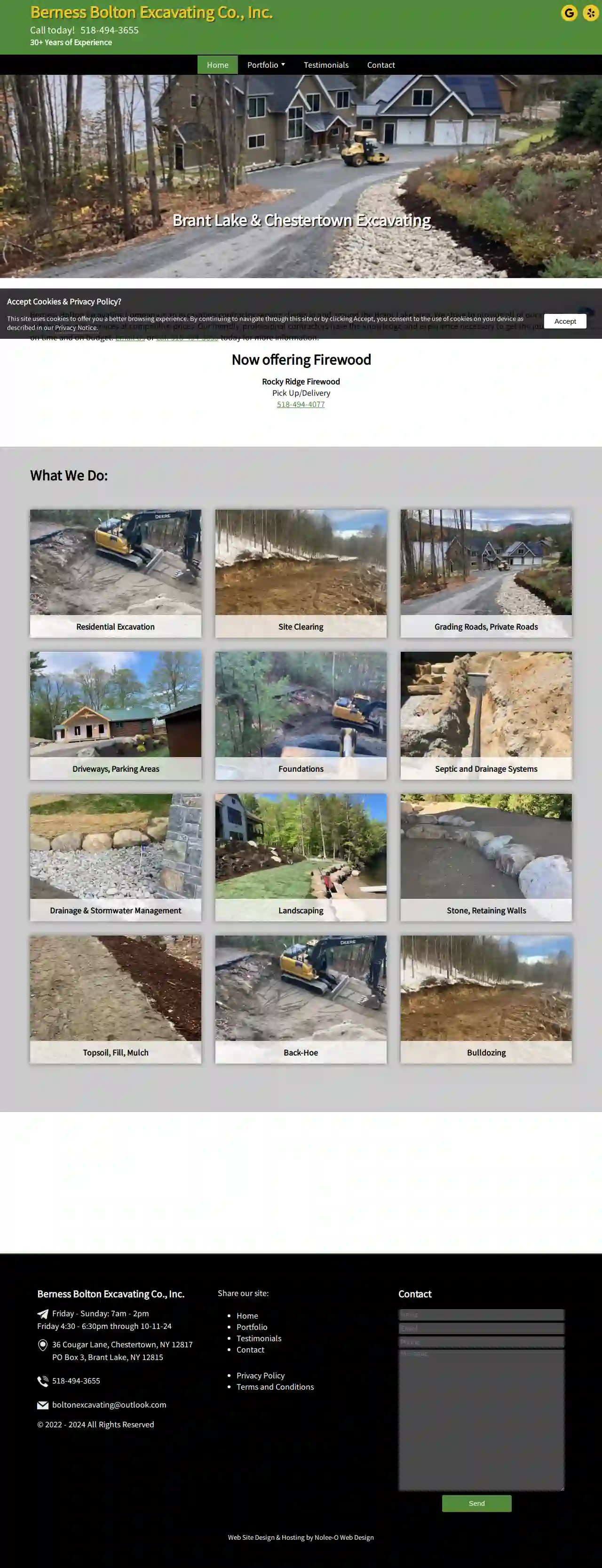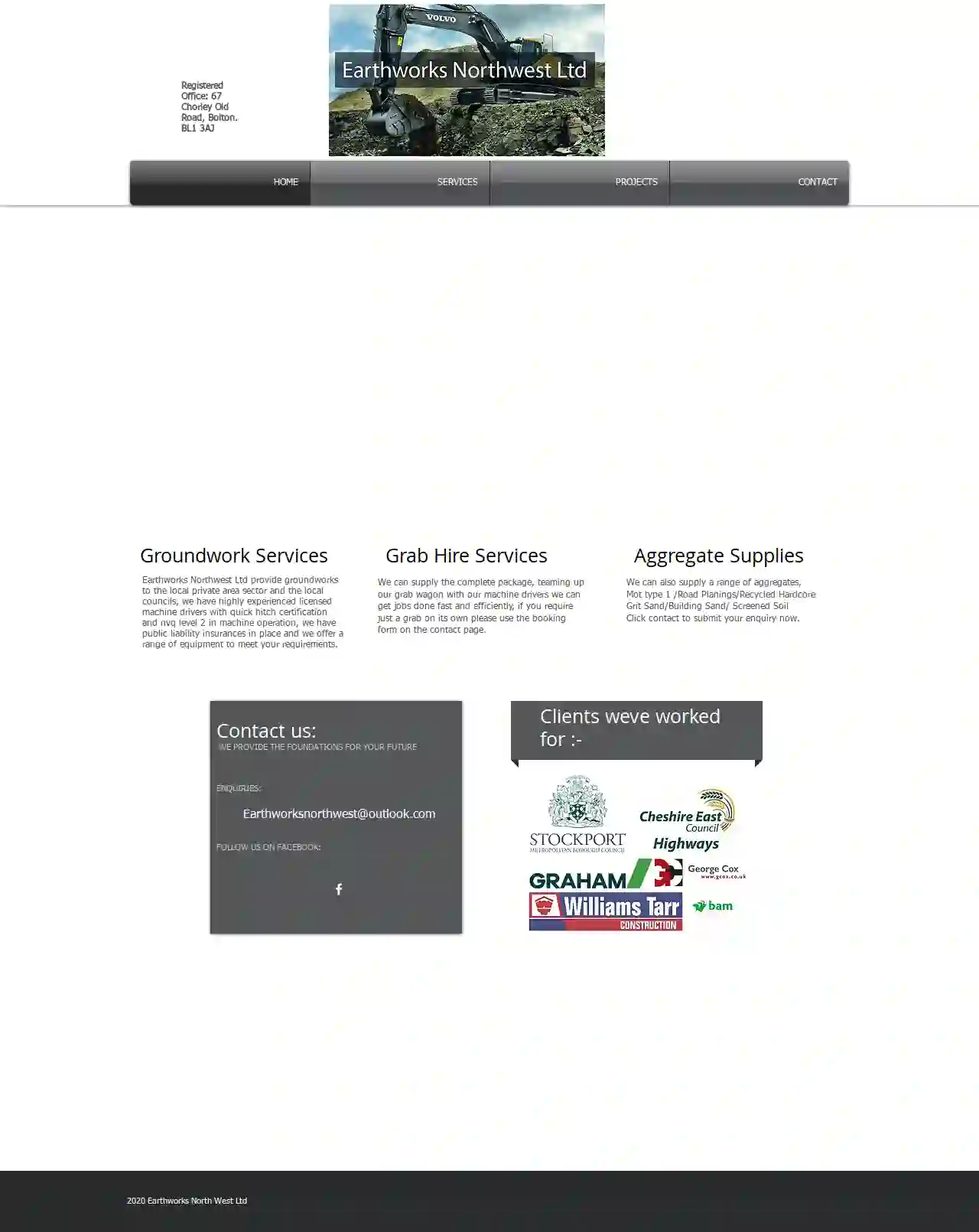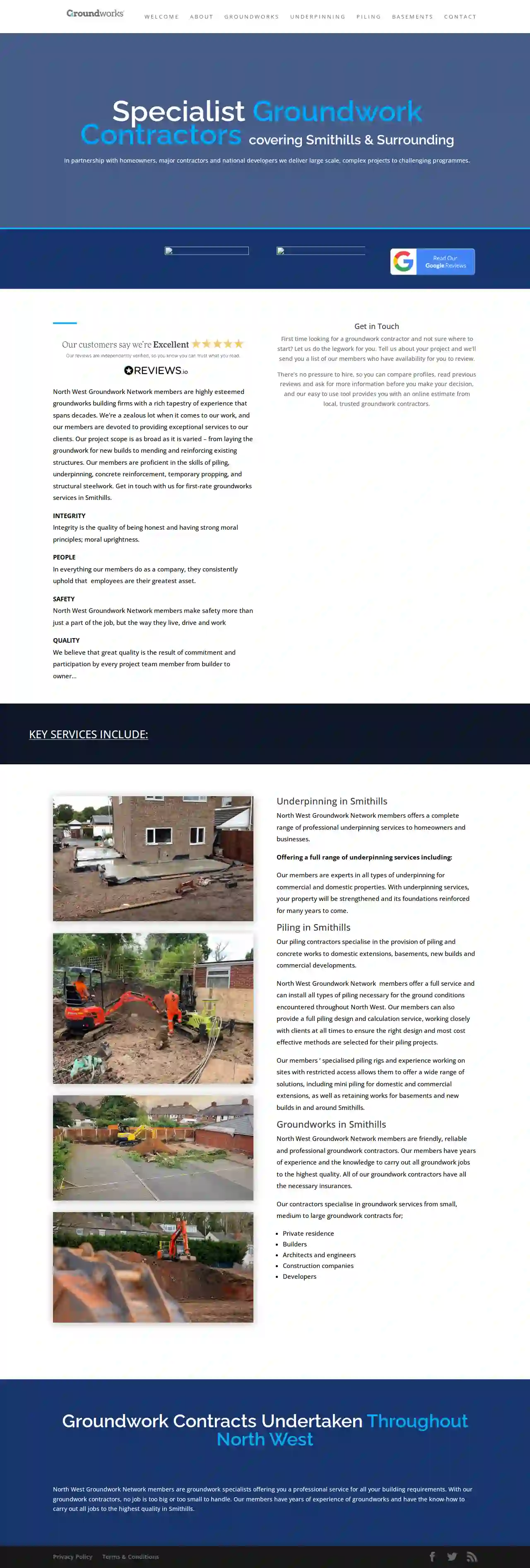Demolition Contractors Blackrod
Best Demolition Companies in Blackrod
Receive 3 FREE Demolition Company Near Me quotes for your project today! Compare profiles, reviews, accreditations, portfolio, etc... and choose the best service.

Berness Bolton Excavating Company
57 reviews36 Cougar Lane, Chestertown, 12817, GBBerness Bolton Excavating Company Berness Bolton Excavating Company is a trusted excavating contractor serving clients in and around the Brant Lake area. We are committed to providing high-quality services at competitive prices. Our friendly and professional team has the expertise and experience to ensure your project is completed on time and within budget. We take pride in our work and strive to exceed your expectations. Whether you need residential excavation, site clearing, grading, driveway construction, foundation work, septic and drainage systems, or landscaping services, we have the skills and equipment to handle it all. We also offer a wide range of services, including: • Residential Excavation • Site Clearing • Grading Roads, Private Roads • Driveways, Parking Areas • Foundations • Septic and Drainage Systems • Drainage & Stormwater Management • Landscaping • Stone, Retaining Walls • Topsoil, Fill, Mulch • Back-Hoe • Bulldozing Contact us today for a free estimate and let us help you bring your vision to life.
- Services
- Why Us?
- Testimonials
- Gallery
Get Quote- Ni
Nick Perrone Trucking & Excavating
Bolton, GBAbout Nick Perrone Trucking & Excavating Nick Perrone Trucking & Excavating is a family-owned and operated business with over 20 years of experience in the construction industry. We are committed to providing our clients with high-quality services at competitive prices. We specialize in a wide range of services, including: Site preparation Excavation Grading Demolition Hauling And more! We are fully licensed and insured, and we have a team of experienced professionals who are dedicated to providing our clients with the best possible service. We are also committed to safety and environmental responsibility. We are proud to serve the [City, State] area.
- Services
- Why Us?
- Gallery
Get Quote 
G Demolition services Ltd
51 reviews11 Abbot Croft, Westhoughton, Bolton, BL5 2ET, GBAbout Us Founded in 2021, G DEMOLITION SERVICES LTD has been providing top-quality demolition services to clients in the Greater Manchester area for the past couple of years but have been part of the demolition industry for over 20 years. Our team of experienced professionals are committed to safety, efficiency, and customer satisfaction. Our Services G DEMOLITION SERVICES LTD offers a wide range of demolition services, including commercial, residential, and industrial demolition, as well as excavation and site preparation. We also provide debris removal and recycling services to ensure a clean and sustainable demolition process. Our Commitment to Safety At G DEMOLITION SERVICES LTD, safety is our top priority. We follow strict safety protocols and procedures to ensure the safety of our team, clients, and the general public. We are fully licenced and insured, and our team members undergo regular training to stay up-to-date on the latest safety practises.
- Services
- Why Us?
- Gallery
Get Quote
G&W BUILDING (Bolton) Ltd
54 reviews32 Warwick Road, Radcliffe, M26 4HL, GBWelcome to G&W Building, where excellence meets craftsmanship in every project we undertake. As a trusted name in construction services, we take pride in delivering high-quality solutions tailored to meet your needs. From seamless home extensions that expand your living space to efficient drainage systems that safeguard your property, and durable tarmac and concrete installations that enhance functionality, we are your premier choice in Manchester and the Northwest. With a commitment to punctuality and precision, we ensure that every aspect of your project is completed to the highest standards. Discover the difference with G&W Building as we transform your vision into reality, exceeding expectations every step of the way. A little about us Our History G&W BUILDING (Bolton) Ltd was established in 1971 by Derek Walker at the age of 28. 12 years prior to this was how G&W Building was formed. Derek’s father, John decided on Derek’s 16th Birthday to walk Derek up a local farm lane to a local farmer who had a construction business specialising in farm buildings. John asked the farm owner “Do you needed any laborours to become skilled workers?” The farm owner replied “We need bricklayers.” John replied “That will do.” and left his son Derek on the farm that morning. From then on Derek quickly became a skilled bricklayer, building many farm buildings for North West Water, outbuildings such as milking parlours and dairies, barn conversions, cattle housing and much more all across the North West. Derek quickly became known in the local and surrounding areas for his skills surrounding farm buildings and became quite the farm build specialist winning a farm builder of the year award. Many of those buildings are still being used today. From this, Derek built relationships with local businesses and property owners building new and modernising old buildings including the new builds in our local town of Radcliffe, Greater Manchester on Church St West. You can see the pictures of those buildings published on our website. We are recognised by many as a trustworthy company who have knowledge and experience in building and landscapes both for residential and commercial customers. We offer a guarantee that our work will be carried out to a high standard and customers can rest easy knowing that we are reliable, family run tradesmen and women. Please feel free to contact one of our family members with any queries you may have as we do cover most aspects of building, landscaping, drainage and groundworks.
- Services
- Why Us?
- Testimonials
- Gallery
Get Quote
Earthworks North West Ltd
51 reviews67 Chorley Old Road, Bolton, BL1 3AJ, GBEarthworks Northwest Ltd Earthworks Northwest Ltd provides groundworks to the local private area sector and the local councils. We have highly experienced licensed machine drivers with quick hitch certification and NVQ level 2 in machine operation. We have public liability insurances in place and we offer a range of equipment to meet your requirements. Grab Hire Services We can supply the complete package, teaming up our grab wagon with our machine drivers we can get jobs done fast and efficiently. If you require just a grab on its own please use the booking form on the contact page. Aggregate Supplies We can also supply a range of aggregates: Mot type 1 Road Planings Recycled Hardcore Grit Sand Building Sand Screened Soil Click contact to submit your enquiry now.
- Services
- Why Us?
- Gallery
Get Quote
D C Excavating
Bolton, GBSpecialist Groundwork Contractors covering Smithills & Surrounding In partnership with homeowners, major contractors and national developers we deliver large scale, complex projects to challenging programmes. North West Groundwork Network members are highly esteemed groundworks building firms with a rich tapestry of experience that spans decades. We’re a zealous lot when it comes to our work, and our members are devoted to providing exceptional services to our clients. Our project scope is as broad as it is varied – from laying the groundwork for new builds to mending and reinforcing existing structures. Our members are proficient in the skills of piling, underpinning, concrete reinforcement, temporary propping, and structural steelwork. Get in touch with us for first-rate groundworks services in Smithills. Our Values INTEGRITY Integrity is the quality of being honest and having strong moral principles; moral uprightness. PEOPLE In everything our members do as a company, they consistently uphold that employees are their greatest asset. SAFETY North West Groundwork Network members make safety more than just a part of the job, but the way they live, drive and work QUALITY We believe that great quality is the result of commitment and participation by every project team member from builder to owner… Get in Touch First time looking for a groundwork contractor and not sure where to start? Let us do the legwork for you. Tell us about your project and we’ll send you a list of our members who have availability for you to review. There’s no pressure to hire, so you can compare profiles, read previous reviews and ask for more information before you make your decision, and our easy to use tool provides you with an online estimate from local, trusted groundwork contractors.
- Services
- Why Us?
- Gallery
Get Quote
Seddon
4.631 reviewsPlodder Lane, Edge Fold, Bolton, BL4 0NN, GBSeddon: Building Relationships and Lasting Change Seddon is a leading construction and development company, providing end-to-end services for customers across the North West and Midlands regions. Established in 1897, we've grown from a small family business to a national company employing over 700 people. But we've never lost sight of what really matters: building relationships is as important as building buildings. Our Commitment to People and Sustainability At Seddon, we put people first and have worked hard to embed sustainability into the core of our business operations. We strive to create shared value for both our business and society. Our commitment goes beyond ethical workplace practices and environmental efficiencies. We work with our own people and the communities we serve to ensure our activities are channeled where they are wanted and needed the most, helping to affect positive lasting change in the communities where we live and work.
- Services
- Why Us?
- Gallery
Get Quote
M D Construction (Bolton) Ltd
UNIT 4, RIVERSIDE BUSINESS PARK, ROYD INGS AVENUE, KEIGHLEY, WEST YORKSHIRE BD21 4BY, Keighley, BD21 4BY, GBAbout MD Construction MD Construction (Bolton) Limited was founded by Mark Davies to meet the growing demand for construction services tailored to lift and escalator manufacturers. Recognizing the need for dedicated teams for both new build and replacement projects, the company thrived in the booming construction industry of the late 1990s. This specialized focus has continued under new management, leveraging existing expertise, equipment, and skilled personnel. Today, MD Construction boasts several experienced site teams across the UK, supporting major OEMs and independent lift and escalator providers. These teams are backed by in-house design services, CAD operators, project managers, LEIA Testers, and Electricians, ensuring comprehensive project support.
- Services
- Why Us?
- Gallery
Get Quote- Bo
Bolton Dirt Work & Septic
4.814 reviewsBolton, GB- Services
- Why Us?
Get Quote - Si
Sierra Excavating Enterprises Inc
4.36 reviewsBolton, GB- Services
- Why Us?
Get Quote
Over 13,059+ Excavation Pros in our network
Our excavation experts operate in Blackrod & surroundings!
ExcavationHQ has curated and vetted Top Excavation Pros near Blackrod. Find the most trustworthy business today.
Frequently Asked Questions About Demolition Contractors
- Dust Suppression: Use water spraying, misting systems, or other dust suppression techniques to control airborne particles.
- Noise Barriers: Erect temporary noise barriers around the demolition site to reduce noise transmission to nearby properties.
- Work Schedule: Schedule noisy demolition activities during permitted hours to minimize disturbance to neighbors.
- Communication: Keep neighbors informed about the demolition schedule and any potential disruptions.
- Size and Type of Structure: The method should be suitable for the structure's size, height, and construction materials.
- Site Location and Accessibility: The method should be feasible given the site's location, surrounding buildings, and access constraints.
- Environmental Considerations: Prioritize methods that minimize environmental impact, such as deconstruction or selective demolition if feasible.
- Budget: Different demolition methods have varying costs, so choose one that fits your budget.
- Safety: Prioritize methods that ensure worker safety and minimize risks to surrounding areas.
- Implosion: Using explosives to collapse a structure inwards rapidly. Suitable for large buildings in open areas.
- Wrecking Ball: Swinging a large steel ball to impact and break down the structure. Effective for bringing down walls and other solid elements.
- High-Reach Demolition: Utilizing specialized excavators with extended arms and demolition attachments for dismantling tall structures piece by piece.
- Selective Demolition: Removing specific parts of a building while preserving other sections. Often used in renovation projects.
- Deconstruction: Carefully dismantling a building to salvage reusable materials, reducing waste and environmental impact.
- Enclosure: Sealing off the asbestos-containing material to prevent fiber release.
- Encapsulation: Coating the asbestos-containing material with a sealant to bind the fibers.
- Removal: Carefully removing the asbestos-containing material and disposing of it safely.
How can I minimize the dust and noise from demolition?
How do I choose the right demolition method for my project?
What are the different types of demolition?
What are the different methods of asbestos abatement?
How can I minimize the dust and noise from demolition?
- Dust Suppression: Use water spraying, misting systems, or other dust suppression techniques to control airborne particles.
- Noise Barriers: Erect temporary noise barriers around the demolition site to reduce noise transmission to nearby properties.
- Work Schedule: Schedule noisy demolition activities during permitted hours to minimize disturbance to neighbors.
- Communication: Keep neighbors informed about the demolition schedule and any potential disruptions.
How do I choose the right demolition method for my project?
- Size and Type of Structure: The method should be suitable for the structure's size, height, and construction materials.
- Site Location and Accessibility: The method should be feasible given the site's location, surrounding buildings, and access constraints.
- Environmental Considerations: Prioritize methods that minimize environmental impact, such as deconstruction or selective demolition if feasible.
- Budget: Different demolition methods have varying costs, so choose one that fits your budget.
- Safety: Prioritize methods that ensure worker safety and minimize risks to surrounding areas.
What are the different types of demolition?
- Implosion: Using explosives to collapse a structure inwards rapidly. Suitable for large buildings in open areas.
- Wrecking Ball: Swinging a large steel ball to impact and break down the structure. Effective for bringing down walls and other solid elements.
- High-Reach Demolition: Utilizing specialized excavators with extended arms and demolition attachments for dismantling tall structures piece by piece.
- Selective Demolition: Removing specific parts of a building while preserving other sections. Often used in renovation projects.
- Deconstruction: Carefully dismantling a building to salvage reusable materials, reducing waste and environmental impact.
What are the different methods of asbestos abatement?
- Enclosure: Sealing off the asbestos-containing material to prevent fiber release.
- Encapsulation: Coating the asbestos-containing material with a sealant to bind the fibers.
- Removal: Carefully removing the asbestos-containing material and disposing of it safely.